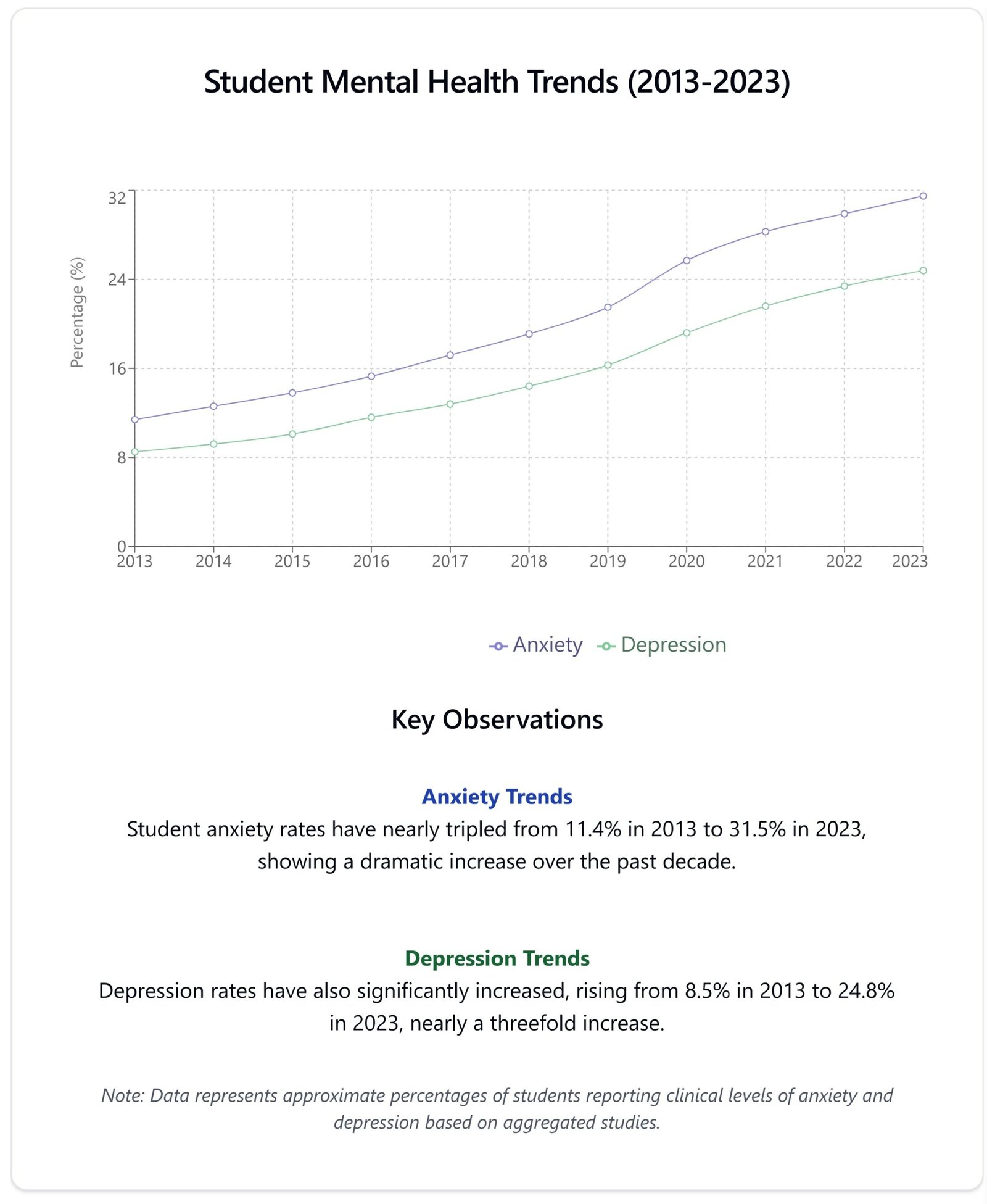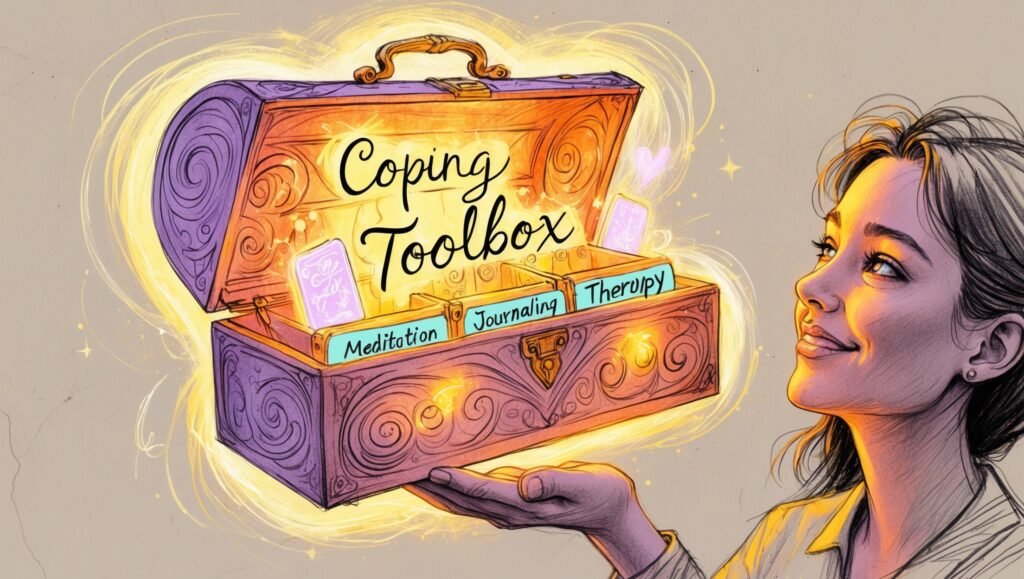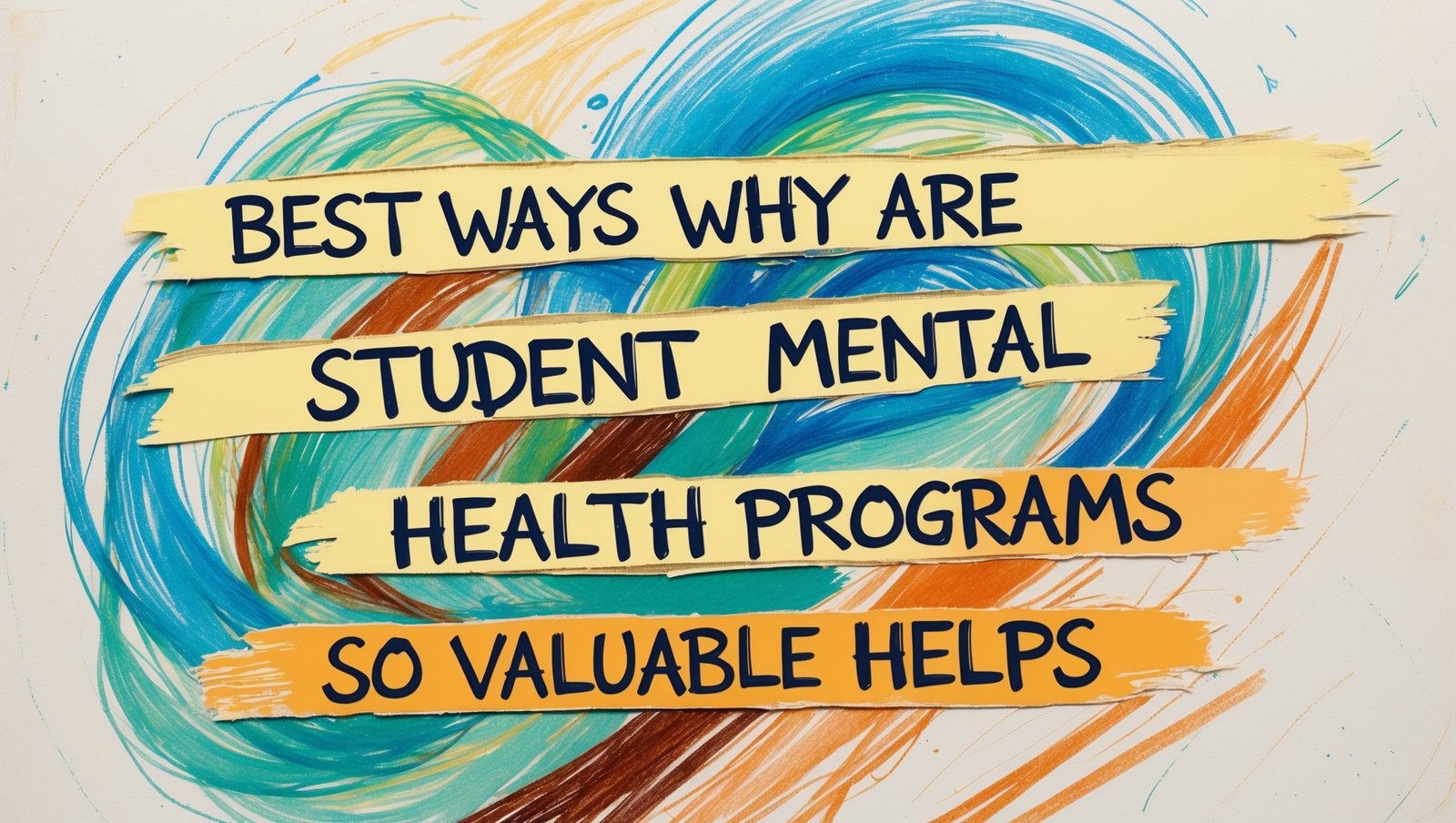Understanding the Need for Mental Health Programs
Have you ever thought about the pressures students face every day? From academic demands to social expectations, students are constantly balancing many aspects of their lives. But what happens when all that stress starts to feel overwhelming? This is where mental health programs come into play.

Student mental health programs are designed to support young people during a time when they are navigating new challenges, developing their identities, and preparing for the future. These programs are not just beneficial—they are essential for a student’s well-being and success.
In this article, we’ll explore why student mental health programs are so valuable, how they benefit students, and why they should be a fundamental part of any educational institution.
Table of Contents
The Rise of Mental Health Concerns Among Students
In recent years, mental health issues among students have skyrocketed. From anxiety to depression, these challenges are becoming more common in educational settings. According to recent studies, a significant percentage of students experience mental health concerns that impact their daily lives and academic performance.

Why is this happening? The pressures of modern life, the increasing demands of schoolwork, and the influence of social media are contributing factors. These stressors can lead to a variety of issues such as sleep disturbances, poor concentration, and even feelings of isolation.
It’s no surprise then that schools are starting to recognize the importance of offering mental health support. The need for student mental health programs has never been more critical.
The Role of Mental Health Programs in Schools
Student mental health programs serve as a safety net for students who may be struggling. These programs typically include counseling, workshops, and various resources designed to address the mental well-being of students.
But what makes these programs so valuable? First, they provide immediate support to students in need. Whether it’s a school counselor to talk to or a stress management workshop, these programs give students the tools they need to manage their mental health effectively.

In addition, mental health programs aim to create a culture where mental well-being is prioritized. By integrating mental health education into school curricula, students learn that it’s okay to ask for help when they’re feeling overwhelmed, stressed, or anxious.
Why Are Student Mental Health Programs So Valuable?
You might be wondering, “Why are student mental health programs so valuable?” The answer is simple: they directly impact students’ lives in meaningful ways. Here are some of the key benefits:

- Prevention of Mental Health Crises: By offering early intervention, mental health programs can identify and address issues before they become serious problems. This proactive approach can prevent students from reaching a crisis point.
- Enhanced Well-Being: Students who receive mental health support tend to have better overall mental well-being. They are more likely to be emotionally stable, less anxious, and better equipped to handle stress.
- Improved Social Skills: Mental health programs often focus on teaching students how to manage their emotions and communicate effectively with others. This improves their social interactions and relationships with peers and teachers.
- Academic Success: When students’ mental health needs are addressed, they are more likely to focus on their studies and perform well academically. A positive mental state is crucial for concentration and learning.
Early Intervention: Preventing Long-Term Problems
One of the most powerful aspects of mental health programs is their ability to catch issues early. Students can be given tools to manage their emotions, stress, and anxiety before these issues turn into long-term struggles.

Early intervention can prevent things like burnout, substance abuse, or even severe mental health conditions like depression. Just like a small crack in a wall can become a huge problem if left unchecked, early mental health issues can snowball into more significant problems if not addressed.
By having mental health programs in place, schools can step in early to provide students with the support they need to avoid long-term consequences.
Reducing Stigma Around Mental Health
One of the biggest challenges students face when it comes to mental health is the stigma surrounding it. Many students feel embarrassed or ashamed to ask for help, often fearing judgment from their peers.

Mental health programs play a critical role in reducing this stigma by normalizing mental health conversations. When students see that mental health support is available, they are more likely to reach out when they need help.
This culture of openness fosters an environment where students can talk freely about their struggles without fear of being judged or marginalized.
Creating a Supportive Environment for Students
Mental health programs do more than just provide counseling—they create an entire supportive ecosystem for students. Teachers, school staff, and parents all play a role in creating a culture where students feel safe and supported.
Programs often include training for teachers to recognize the signs of mental health struggles and to respond appropriately. This ensures that students feel understood and valued by the people they interact with daily.
Improving Academic Performance Through Mental Health Support
Have you ever tried to focus on studying while you’re feeling stressed or anxious? It’s incredibly hard, right?
Mental health issues often make it difficult for students to concentrate on their studies. By offering mental health support, students are better able to focus on their academic work, leading to better grades and improved school performance.

When students know that their mental health is being prioritized, they are more likely to feel confident in their ability to succeed in school.
The Role of Teachers and Staff in Mental Health Programs
Teachers and staff play a pivotal role in the success of student mental health programs. They are often the first line of defense when it comes to identifying students who may be struggling. Whether it’s noticing a drop in performance or recognizing behavioral changes, teachers are in a unique position to support students.
Many mental health programs train educators to spot early warning signs of mental health issues and provide them with strategies to support students in need. This helps create a more holistic support system for students.
How Mental Health Programs Encourage Healthy Coping Mechanisms
Mental health programs teach students valuable coping mechanisms that they can use for the rest of their lives. These skills include mindfulness, relaxation techniques, time management, and emotional regulation. When students are equipped with these tools, they are better able to navigate the stresses and challenges that come their way.

Imagine these coping strategies as a toolkit—each skill is a tool that helps students manage life’s difficulties in a healthy way. The more tools they have, the more equipped they are to face any challenge.
Fostering Emotional Intelligence in Students
Emotional intelligence (EQ) is the ability to understand and manage one’s emotions, as well as recognize and influence the emotions of others. Mental health programs focus on developing EQ in students, which can help them build strong relationships, make better decisions, and handle stress more effectively.

Students with high emotional intelligence are more likely to be empathetic, communicate effectively, and navigate social situations with ease. These skills are invaluable not only in school but throughout life.
Building Resilience and Self-Esteem in Students
Resilience is the ability to bounce back from setbacks, and self-esteem refers to how we view ourselves. Both are essential for a student’s success, and mental health programs work to build these traits.
By helping students navigate difficulties and teaching them how to handle failure, these programs encourage resilience. They also boost students’ self-esteem by offering validation, support, and a sense of belonging.
Inclusive Mental Health Programs: Addressing All Needs
Not all students have the same mental health needs. Some may struggle with anxiety, while others may face depression or ADHD. Inclusive mental health programs ensure that every student’s needs are met, regardless of their individual struggles.
These programs are designed to be flexible and tailored to the unique challenges each student faces, making mental health support accessible to all.
The Long-Term Impact of Student Mental Health Programs
The benefits of student mental health programs don’t end when students graduate. The skills, strategies, and emotional intelligence they gain continue to serve them throughout their lives. These programs help students become more well-rounded, mentally resilient adults who are better prepared to handle the challenges of adulthood.
How Parents and Communities Can Support Mental Health Programs
Parents and communities play a critical role in supporting mental health programs. By advocating for mental health resources and supporting initiatives within schools, they help ensure that these programs remain effective and accessible.
Open communication between parents, teachers, and mental health professionals can create a more robust support network for students.
The Future of Student Mental Health Support
As awareness of mental health continues to grow, the future of student mental health programs looks bright. Schools are increasingly recognizing the importance of mental health in academic and personal development, leading to greater investments in resources and programs.

With the right support, students can thrive academically, socially, and emotionally, setting them up for success in the future.
Conclusion
In conclusion, student mental health programs are incredibly valuable. They not only support students through their academic journey but also equip them with the tools to lead emotionally healthy and successful lives. By investing in these programs, schools can help students navigate life’s challenges and set them up for a brighter future.

Frequently Asked Questions (FAQs)
1. Why are student mental health programs so important?
Student mental health programs are crucial because they provide early intervention, reduce stigma, and promote emotional well-being, ultimately helping students succeed academically and personally.
2. How do mental health programs affect academic performance?
Mental health programs help students manage stress and anxiety, improving their focus, concentration, and overall academic performance.
3. Can mental health programs prevent long-term mental health issues?
Yes, early intervention through mental health programs can prevent issues from escalating into more serious long-term problems, such as depression or anxiety disorders.
4. How can schools reduce stigma around mental health?
Schools can reduce stigma by openly discussing mental health, integrating it into their curricula, and providing accessible support resources for students in need.
5. What role do parents play in supporting student mental health programs?
Parents play an important role by advocating for mental health resources, maintaining open communication with teachers, and supporting their children’s emotional needs at home.





